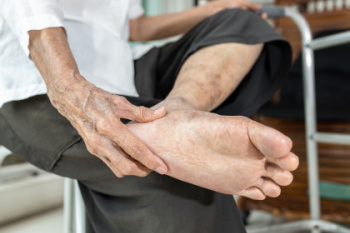
Tarsal tunnel syndrome, or TTS, is a condition characterized by compression of the tibial nerve as it passes through the tarsal tunnel, located on the inner side of the ankle. This compression can lead to a variety of symptoms, including pain, tingling, burning sensations, and numbness along the inner ankle and sole of the foot. Individuals with TTS may also experience weakness in the muscles of the foot, particularly the toes, and may have difficulty standing or walking for prolonged periods of time. Symptoms of TTS often worsen with activity or prolonged standing, and may be worsened by wearing tight shoes or engaging in activities that require repetitive ankle motion. In some cases, the pain and discomfort of TTS can be severe enough to interfere with daily activities and significantly impact quality of life. Early recognition and treatment of tarsal tunnel syndrome is essential to prevent further nerve damage and alleviate symptoms. If you suspect you may have TTS, it is suggested that you confer with a podiatrist who can offer you treatment options that are right for you.
Tarsal tunnel syndrome can be very uncomfortable to live with. If you are experiencing tarsal tunnel syndrome, contact Deborah Rosenfeld of Rosenfeld Podiatry. Our doctor can provide the care you need to keep you pain-free and on your feet.
Tarsal Tunnel Syndrome
Tarsal tunnel syndrome, which can also be called tibial nerve dysfunction, is an uncommon condition of misfiring peripheral nerves in the foot. The tibial nerve is the peripheral nerve in the leg responsible for sensation and movement of the foot and calf muscles. In tarsal tunnel syndrome, the tibial nerve is damaged, causing problems with movement and feeling in the foot of the affected leg.
Common Cause of Tarsal Tunnel Syndrome
- Involves pressure or an injury, direct pressure on the tibial nerve for an extended period of time, sometimes caused by other body structures close by or near the knee.
- Diseases that damage nerves, including diabetes, may cause tarsal tunnel syndrome.
- At times, tarsal tunnel syndrome can appear without an obvious cause in some cases.
The Effects of Tarsal Tunnel Syndrome
- Different sensations, an afflicted person may experience pain, tingling, burning or other unusual sensations in the foot of the affected leg.
- The foot muscles, toes and ankle become weaker, and curling your toes or flexing your foot can become difficult.
- If condition worsens, infections and ulcers may develop on the foot that is experiencing the syndrome.
A physical exam of the leg can help identify the presence of tarsal tunnel syndrome. Medical tests, such as a nerve biopsy, are also used to diagnose the condition. Patients may receive physical therapy and prescriptive medication. In extreme cases, some may require surgery.
If you have any questions please feel free to contact our office located in Marlton, NJ . We offer the newest diagnostic and treatment technologies for all your foot and ankle needs.

Pregnancy brings about a multitude of changes in a woman's body, including the feet. As the body undergoes hormonal shifts and weight gain, it is not uncommon for expectant mothers to experience foot pain and discomfort. One common area of foot pain during pregnancy is the arches, as the added weight can cause the arches to flatten, leading to strain and discomfort. Additionally, swelling of the feet and ankles, known as edema, is a prevalent issue, particularly in the later stages of pregnancy. This swelling can cause tightness and discomfort in various areas of the feet. Another common source of foot pain during pregnancy is the heels, as the increased weight and changes in posture can place extra pressure on the heel area, resulting in pain and tenderness. If you have foot pain during your pregnancy, it is suggested that you consult a podiatrist who can offer you relief tips during this transformative time.
Pregnant women with swollen feet can be treated with a variety of different methods that are readily available. For more information about other cures for swollen feet during pregnancy, consult with Deborah Rosenfeld from Rosenfeld Podiatry. Our doctor will attend to all of your foot and ankle needs.
What Foot Problems Can Arise During Pregnancy?
One problem that can occur is overpronation, which occurs when the arch of the foot flattens and tends to roll inward. This can cause pain and discomfort in your heels while you’re walking or even just standing up, trying to support your baby.
Another problem is edema, or swelling in the extremities. This often affects the feet during pregnancy but tends to occur in the later stages.
How Can I Keep My Feet Healthy During Pregnancy?
- Wearing orthotics can provide extra support for the feet and help distribute weight evenly
- Minimize the amount of time spent walking barefoot
- Wear shoes with good arch support
- Wear shoes that allow for good circulation to the feet
- Elevate feet if you experience swelling
- Massage your feet
- Get regular, light exercise, such as walking, to promote blood circulation to the feet
If you have any questions please feel free to contact our office located in Marlton, NJ . We offer the newest diagnostic and treatment technologies for all your foot and ankle needs.

Feet are fascinating parts of the body with many interesting facts that children can learn about. Humans have 26 bones in each foot, and these bones work together to provide support, balance, and mobility. The feet have over 100 muscles, tendons, and ligaments, allowing for intricate movements like walking, running, and jumping. Feet also contain thousands of sweat glands, helping to regulate body temperature and keep them cool. Additionally, the soles of the feet are covered in tough skin called calluses, which protect them from friction and pressure. Kids might be surprised to learn that the size and shape of their feet can change as they grow, which is why it is essential to wear properly fitting shoes. By understanding these fun foot facts, children can appreciate the incredible design and functionality of their feet while learning how to care for them to stay healthy and active. If your child has foot pain for any reason, it is suggested that you visit a podiatrist who can offer appropriate treatment options.
The health of a child’s feet is vital to their overall well-being. If you have any questions regarding foot health, contact Deborah Rosenfeld of Rosenfeld Podiatry. Our doctor can provide the care you need to keep you pain-free and on your feet.
Tips for Keeping Children's Feet Healthy
- Make sure their shoes fit properly
- Look for any signs of in-toeing or out-toeing
- Check to see if they have Clubfoot (condition that affects your child’s foot and ankle, twisting the heel and toes inward) which is one of the most common nonmajor birth defects.
- Lightly cover your baby’s feet (Tight covers may keep your baby from moving their feet freely, and could prevent normal development)
- Allow your toddler to go shoeless (Shoes can be restricting for a young child’s foot)
- Cut toenails straight across to avoid ingrown toenails
- Keep your child’s foot clean and dry
- Cover cuts and scrapes. Wash any scratches with soap and water and cover them with a bandage until they’ve healed.
If you have any questions, please feel free to contact our office located in Marlton, NJ . We offer the newest diagnostic and treatment technologies for all your foot care needs.


